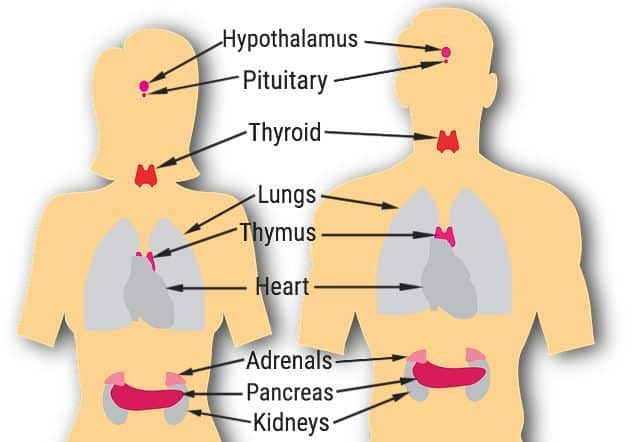The Thyroid Gland

Hormones play a major role in determining how our bodies will function and how we are going to look. Although insulin and cortisol affect our metabolism, the thyroid plays the most significant role in influencing our metabolism.
How the Thyroid Works

The hypothalamus is a very small gland in the brain made up of sensors that test the hormonal environment within the body. The hypothalamus then sends information to the pituitary (also located in the brain below the hypothalamus). The pituitary produces Thyroid Stimulating Hormone or TSH and sends messages to the adrenal glands (located on top of the kidneys). TSH tells the thyroid gland (located at the front of the neck) to produce the hormone T4. High TSH = low thyroid hormone.
The adrenal glands use cholesterol to produce different hormones, like epinephrine, cortisol, estrogen, progesterone, and testosterone. Having cholesterol in your diet is very important for hormone production.
Cortisol is an amazing anti-inflammatory when the body is under stress. However, when cortisol is high thyroid hormone will be low. We don’t need to be digesting when we are stressed out because of a bear attack or other stressful situation. In a stressful situation we usually need our energy directed to our muscles instead.
T4 is produced in the thyroid and converted to the active thyroid hormone T3 in the liver, kidneys, intestines, and lungs. The T4 is transported to these organs via thyroid-binding globulin. Selenium and iodine are also essential in this T4 production and T3 conversion. Selenium can be found in bacon, smelt, herring, scallops, and Brazil nuts. Selenium also detoxifies mercury. T=thyroid, 3=3 iodine molecules.
Some of the Problems That Cause Low Thyroid Hormone

The following are examples of issues that can stunt your T3, slowing your metabolism, and ultimately causing weight gain.
- Polyunsaturated fats, pesticides, preservatives, and other toxins in our food can increase inflammation. The more anti-inflammatory cortisol the body produces, the less metabolism-boosting thyroid hormone it creates.
- Nutrient deficiencies may interfere with the proper production of T3 in the body. Selenium, B vitamins, vitamin D and A, iodine, omega 3’s, and zinc are all required for T3 production.
- Many things interfere with globulin’s ability to transport T4 to the organs responsible for converting it into the active thyroid hormone T3. The following are just some of the foods and environmental causes that interfere with globulin: fluoride in water, chlorine in water, bromide in flour, pesticides, commercially produced meat, vaccines, and estrogen (birth control pills), and a plant-based hormone called Xenoestrogen – also called phytoestrogen. Soybeans, a huge source of phytoestrogen, are found in almost all processed/packaged foods because they are a cheap filler.
- Some synthetic estrogen mimetics are found in BPA, PCBs, and the number one being phthalates. Phthalates are in many things: fragrances, cosmetics, detergents, personal care products, plastic softeners like your rubber ducky or shower curtain, nail polish, hair spray, plastic bags, microwaveable containers, safety gloves, printing ink, varnish, and paper coatings such as receipts.
- The top seven foods that cause inflammation are corn, soy, dairy, sugar and other sweeteners, peanuts, eggs, and gluten. Gluten is found in rye, wheat, barley, spelt, oats, and kamut. Gluten is of special mention because the damage it does is so underrated.
- An overburdened allostatic load (all of the stresses on the body combined) can increase inflammation. The three main contributors to your allostatic load are mental stress, toxins, and infections or pathogens. All of these contribute to increased inflammation, resulting in higher cortisol and lower T3.
Symptoms of Low Thyroid

- Sluggishness in the morning
- Poor concentration and memory
- Low-grade depression
- Dry skin
- Hoarse voice
- Thinning hair
- Coarse hair
- Being very sensitive to cold and having cold hands and feet
- Low body temperature
- Muscle pain
- Weakness or cramps
- Low sex drive
- Fluid retention
- High cholesterol
Fixing Low Thyroid

- Detoxification – Avoid toxins, addictions, and allergens. Toxins include pesticides and preservatives in food. Mercury is especially bad and is frequently found in bigger fish, like tuna. Also avoid chlorinated/fluoridated water. Eating nutrient rich organic foods and filtering your water with a reverse osmosis water filter is the best practice. Also, if you leave a pitcher of water out overnight, the chlorine will evaporate.
- People under chronic stress display high cortisol levels and, therefore low thyroid hormone levels. You need to find a way to eliminate your stressors. Many ways to reduce stress can be found in my articles on sleep, stress, allostatic load, stress relief, and many others. Also, proper meditation or yoga is very beneficial.
- “One warning is that if your adrenal glands are burned out from long-term stress, treating the thyroid without supporting the adrenal glands through relaxation and adaptogenic herbs (such as ginseng, rhodiola, or Siberian ginseng) can actually make you feel worse.” (Dr. Mark Hyman)
- Exercise is important, not only as a stress reliever, but it stimulates thyroid hormone production. Come see me for a free consultation for best results.
I have to add something really important for those that have trouble with weight loss. As you lose weight, the pesticides in fat cells are released into the body. These pesticides are detrimental to thyroid hormone production. The way to get rid of these pesticides is to sweat. I recommend hot yoga. If you’re having a lazy day, maybe consider the sauna. Both involve a stress reliever and both make you sweat.
Get the nutrients your thyroid needs: Selenium, iodine, zinc, vitamins A and D, and omega 3 fats. Ultimately, if you have a thyroid problem, you may need to take medication to fix it. It may not be permanent if you see the right doctor. Synthroid is a synthetic T4 replacement and may or may not work for you. Armour thyroid includes T4, T3, and T2. Many doctors hold the outdated belief that Armour thyroid is unstable. That used to be true, but not anymore.
“Sometimes, once all the factors that disturbed your thyroid function have been corrected, you may be able to reduce or discontinue the dose. As with any treatment, always work with a physician experienced in using medications to treat your thyroid.” (Dr. Mark Hyman)
I wish you lots of health, love and happiness!
Travis Wade
The only holistic personal trainer in Edmonton.
Want To Get Started On A New Lifstyle Right Away?
Or
Would You Like A Plan To Achieve Your Fitness Goals?
Sign Up For Online Personal Training!

